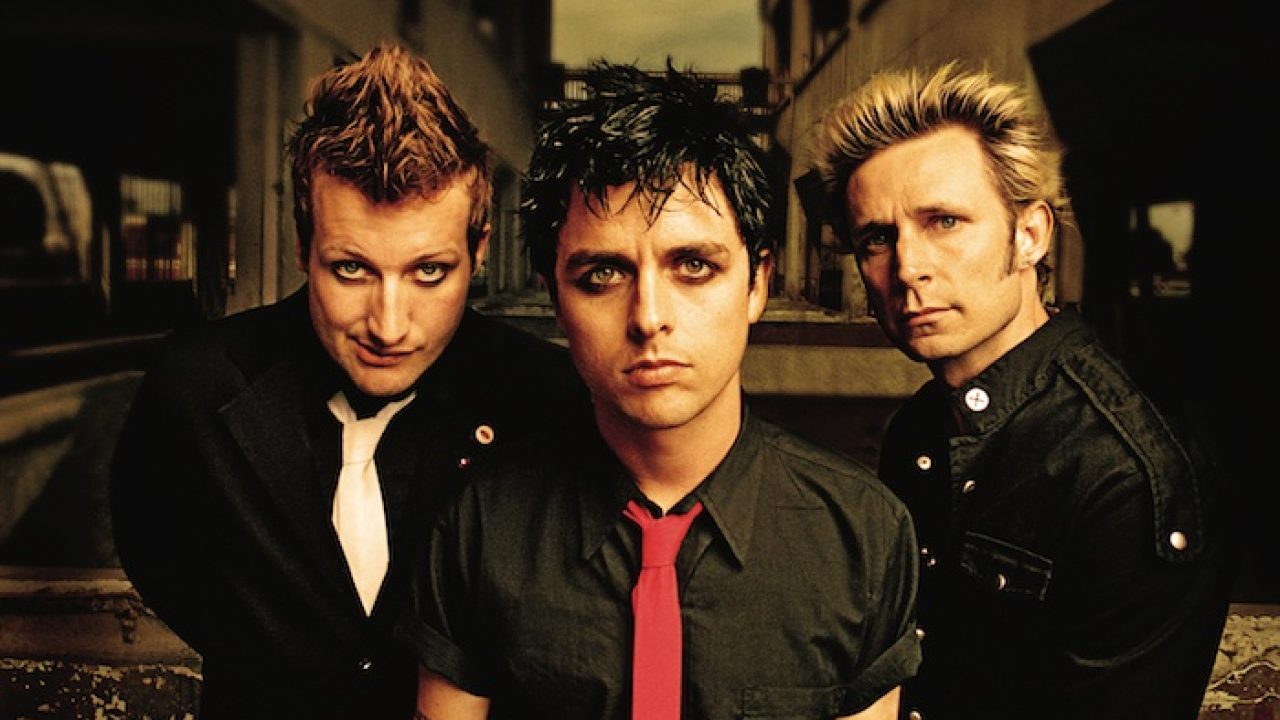The four lads with gel in their hair had punk in their minds.
I confess, my title is a bit full-on. No, I don’t wake up every day, bow to the West and chant “Hail Billie Joe” ten times. No, I don’t think the Foxboro Hot Tubs are misunderstood hard-rock paragons. Yes, the Uno/Dos/Tré album trilogy is overindulgent garbage. Yes, as a band, Green Day are way, way past their sell-by date.
And yet, from my own experience, I can say that, if it wasn’t for one album—one hugely ambitious record, released—a generation of youngsters would not have picked up instruments and started bands. And neither, for that matter, would our wider introduction to guitar music, from punk to progressive rock, have happened.
If you were to tell most record executives that a punk-opera concept album called American Idiot, with two nine-minute, five-movement songs on it, would be the fourth best-selling album of 2006, they would have clobbered you to death with a stapler. But that’s exactly what Green Day did.
American Idiot is the sound of a band wishing to transcend their context. Green Day would have crashed and burned if they were to rip off Dookie and Nimrod again and again: the lukewarm reception their previous release, Warning, received was one stark reminder of this. They were becoming old hat and stale, their audience was fed up. But, the band found themselves energised and pissed off by the surrounding carnage of the Iraq War and George W. Bush—not to mention the zero-calorie smorgasbord that was FM Rock at the time. And as a result, we got the emphatic, daring, ambitious and unapologetically romantic American Idiot.
Not only this, but the band’s aesthetic leant them some pre-My Chemical Romance grandeur. Gone were the green-haired, scruffy, scrappy-doos of yore. Suits, strong colours, eyeliner, timpani drums and classic guitars were in—it was punk-opera, after all.
The fact that such romantic, pompous-looking has-beens spoke to the anxieties of youth is amazing in itself. Such a look didn’t attract ridicule from young people who listened to Billie Joe Armstrong’s rage— knowing that the sanguinary hell of Baghdad awaited them if they enlisted. In fact, it did the opposite. At the time what struck me—a gawky, socially awkward bookworm—was how a lasting impression trickled down to the ‘geeks’, ‘freaks’ and ‘weirdos’ of my school. The outcasts, those girls and boys who would hide under the stairs, or in the quad, or in classrooms, away from the hunting plains of the playground, all of a sudden gained a voice. They congregated on Urbis Gardens and Affleck’s Palace in Manchester, England as they probably did in Manchester, America. They were given a home, a nerve centre, a sense of self and of self-worth.
For such an important record to these people, it was also incredibly accessible to any budding young musician: one trip to ultimate-guitar.com and a YouTube video later, you could pretty much tackle the record yourself. I put down my history books, begged for a starfire P-bass knockoff from Cash Converter, and got cracking. In two months I was performing covers from the album, as a singer and bassist, in a cricket club in Unsworth, Bury. We sucked, as all teenage bands ought to at one stage or another, but polite cheers and the adrenaline rush from playing was enough to herald our arrival. In short, Green Day gave us a place where we fit.
I’m far from the only one with a similar story. Years later, working as a session bassist, nearly everyone I met my age—on instruments from organs to drums to guitars to vocals and back—felt the urge to play heavier and faster because of that record. Many had not considered music until the first chords of that record smashed through their earphones on one unsuspecting day.
Even now, you won’t find this in my top ten records, probably not in my top fifty. It reminds me of all the BO-scented, bumfluffed despair of my teens, and I have little wish to look back on those days with any fondness. But Chris Rock said that the music you listened to when you started to get laid is the music you’ll love forever, and he was right. I was a few years away from that, by which point I had moved on to Stoner Metal, and so American Idiot remained a thing of the past. A thing of the past, however, that I can’t deny as incredibly important for me.
Listen to Green Day on Spotify and Apple Music. And, get the latest edition of our print mag for the music lover in the family this Christmas—it’s bloody brill.


